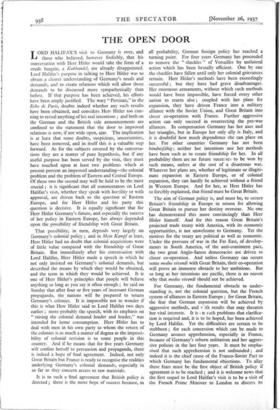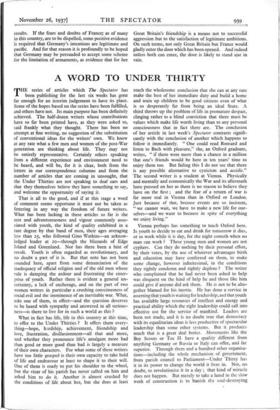THE OPEN DOOR
LORD HALIFAX'S visit to Germany is over, and those who believed, however foolishly, that his conversation with Herr Hitler would take the form of a crude bargain, a Kuhhandel, are already disappointed. Lord Halifax's purpose in talking to Herr Hitler was to obtain a clearer understanding of Germany's needs and demands, and to create relations which will allow those demands to be discussed more sympathetically than before. If that purpose has been achieved, his efforts have been amply justified. The wary " Pertinax," in the Echo de Paris, doubts indeed whether any such results have been obtained, and considers Herr Hitler too cun- ning to reveal anything of his real intentions ; and both on the German and the British side announcements are confined to the statement that the door to improved relations is now, if not wide open, ajar. The implication is at least that some doubts, suspicions, uncertainties, have been removed, and in itself this is a valuable step forward. As for the subjects covered by the conversa- tions they are a matter of pure hypothesis, but if any useful purpose has been served by the visit, they must have touched upon at least two problems which at present prevent an improved understanding—the colonial problem and the problem of Eastern and Central Europe. Of these two the second may well be held to be the most crucial ; it is significant that all commentators on Lord Halifax's visit, whether they speak with hostility or with approval, are driven back to the question of Eastern Europe, and for Herr Hitler and his party this question is decisive. It is equally significant that for Herr Hitler Germany's future, and especially the success of her policy in Eastern Europe, has always depended upon the possibility of friendship with Great Britain.
That possibility, in turn, depends very largely on Germany's colonial policy ; and in Mein Kampf at least, Herr Hitler had no doubt that colonial acquisitions were of little value compared with the friendship of Great Britain. But immediately after his conversation with Lord Halifax, Herr Hitler made a speech in which he not only insisted on Germany's colonial demands, but described the means by which they would be obtained, and the term in which they would be achieved. It is one of Herr Hitler's principles that people will believe anything so long as you say it often enough ; he said on Sunday that after four or five years of incessant German propaganda, the nations will be prepared to return Germany's colonies. It is impossible not to wonder if this is what Herr Hitler said to Lord Halifax two days earlier ; more probably the speech, with its emphasis on " raising the colonial demand louder and louder," was intended for home consumption. Herr Hitler has to deal with men in his own party to whom the return of the colonies is as much a matter of dogma as the impossi- bility of colonial revision is to some people in this country. And if he means that for five years Germany will confine herself to persuasion and propaganda, there is indeed a hope of final agreement. Indeed, not only Great Britain but France is ready to recognise the realities underlying Germany's colonial demands, especially in so far as they concern access to raw materials.
It is to such a final agreement that British policy is directed ; there is the more hope of success because, in all probability, German foreign policy has reached a turning point. For four years Germany has proceeded to remove the " shackles " of Versailles by unilateral action which has been brutally efficient. One by one the shackles have fallen until only her colonial grievances remain. Herr Hitler's methods have been exceedingly successful ; but they have had grave disadvantages. Her enormous armaments, without which such methods would have been impossible, have forced every other nation to rearm also ; coupled with her plans for expansion, they have driven France into a military alliance with the Soviet Union, and Great Britain into closer co-operation with France. Further aggressive action can only succeed in resurrecting the pre-war alliances. In compensation Germany has her axes and her triangles, but in Europe her only ally is Italy, and it is doubtful how much dependence she can place on her. For other countries Germany has not been bfindnisfiihi g; neither her, intentions nor her methods have been such as to create friendship for her. In all probability there are no future succe: ses to be won by such means, unless at the cost of a disastrous war. Whatever her plans are, whether of legitimate or illegiti- mate expansion in Eastern Europe, or of colonial expansion, they can hardly be achieved without a friend in Western Europe. And for her, as Herr Hitler has so forcibly explained, that friend must be Great Britain. - The aim of German policy is, and must be, to secure Britain's friendship in Europe in return for allowing Great Britain to pursue her destiny overseas. No one has demonstrated this more convincingly than Herr Hitler himself. And for this reason Great Britain's projected trade treaty with America, with its economic opportunities, is not unwelcome to Germany. Yet the motives for the treaty are political as well as economic. Under the pressure of war in the Far East, of develop- ments in South America, of the anti-comintern pact, the two great Anglo-Saxon democracies are driven to closer co-operation. And unless Germany can secure some modus vivendi with Great Britain, their co-operation will prove an immense obstacle to her ambitions. But so long as her intentions are pacific, there is no reason why that modus vivendi should not be achieved.
For Germany, the fundamental obstacle to under- standing is, not the colonial question, but the French system of alliances in Eastern Europe ; for Great Britain, the fear that German expansion will be achieved by aggressive methods, and v ith results that may threaten her vital interests. It is ( n such problems that clarifica- tion is required and, it is to be hoped, has been achieved by Lord Halifax. Yet the difficulties are certain to be stubborn ; for each concession which can be made to Germany arouses apprehension, especially in France, because of Germany's reborn militarism and her aggres- sive polieies in the last" four years. It must be empha- sised that such apprehension is not unfounded ; and indeed it is the chief cause of the Franco-Soviet Pact to which Germany has fundamental objections. To allay these fears must be the first object of British policy if agreement is to be reached ; and it is welcome news that the first sequel to Lord Halifax's visit is to be a visit of the French Prime Minister to London to discuss its results. If the fears and doubts of France; as of many in this country, are to be dispelled, some positive evidence is required that Germany's intentions are legitimate and pacific. And for that reason it is profoundly to be hoped that Germany may be persuaded to accept some scheme for the limitation of armaments, as evidence that for her Great Britain's friendship is a means not to successful aggression but to the satisfaction of legitimate ambitions. On such terms, not only Great Britain but France would gladly enter the door which has been opened. And indeed unless both can enter, the door is likely to stand ajar in vain.















































 Previous page
Previous page